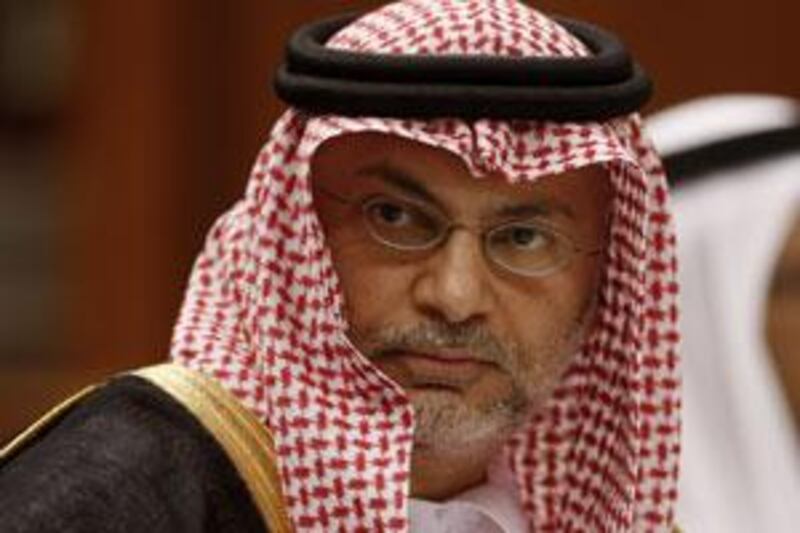The head of the UAE's efforts to eradicate human trafficking has called on the Gulf states to unify and prove they are prepared to stamp out the illegal trade. Dr Anwar Gargash, the Minister of State for Foreign Affairs and the chairman of the UAE National Committee to Combat Trafficking, said the country was at the forefront of regional measures to tackle the issue. But he stressed that a unified effort was "essential to combating this crime".
He said: "It is important to show to the whole world that the Arab region is serious in combating human trafficking, and many efforts are being made to obtain this objective." His statement yesterday, after an anti-trafficking training course for police and prosecutors in Dubai, followed a UN report that examined the region's efforts to deal with the problem. Only the UAE, Bahrain and Oman had a comprehensive legal framework to prosecute people traffickers, it said.
The Global Report on Trafficking Persons, released last month, criticised Saudi Arabia and Iran in particular for refusing to share information about the extent of the problem or to take proper measures to deal with it. It noted that 150 officers were assigned to tackle trafficking in the UAE, where South Asian men make up more than half the convicted offenders. But most victims in this country were women from Uzbekistan, Moldavia and South Asia who had been forced into prostitution, it said.
Yesterday, Dr Gargash said that human trafficking was against Islam and the heritage and ethics of UAE society. As part of the UAE's efforts to tackle the problem, it had sought international expertise from the Geneva-based International Organisation for Migration (IOM), he added. The IOM, which has 125 member states, promotes humane migration and provides services and advice to governments and migrants. It has been working with the UAE to train law enforcement officers to help catch the traffickers.
Dr Gargash said the UAE was toughening its stance on the crime, as demonstrated by the recent establishment of a dedicated anti-trafficking department within the Dubai police. During the IOM training sessions, which were held late last week, about 25 UAE prosecutors, police and officials representing migrant shelters analysed case studies and learnt interview techniques as well as how to identify potential trafficking victims. The training included role playing and tutorials on methods for prosecuting cases, as well as a review of the national trafficking law, Federal Law 51.
The legislation, enacted in 2006, includes a maximum Dh1 million (US$272,000) fine for offenders and possible life imprisonment. The UAE officials were also expected to help develop a UAE-specific model for investigations. Richard Danziger, the head of IOM's Counter Trafficking Division, chaired the workshop and praised the UAE for its interest in learning international best practice for fighting human trafficking. He said the IOM was considering continuing its tutorials for officials on specific aspects of preventing and prosecuting such crimes.
According to the UN's report on trafficking, which was funded partly by a $15 million donation from Sheikh Mohammed bin Zayed, the Crown Prince of Abu Dhabi and Deputy Supreme Commander of the UAE Armed Forces, there were 26 convictions for the crime in the UAE in 2005-2006. Last month, police raids have led to four men being sentenced to five years in prison for running a Deira brothel. In a separate case in Al Muraqabat, three men were arrested for allegedly forcing four women into prostitution.
Dr Gargash has said previously that the UAE has already achieved "key successes" in fighting trafficking "in a short space of time", pointing out that the US state department's annual Trafficking in Persons Report has upgraded the country over its efforts to comply with international standards. The report recommended that the UAE boost law enforcement efforts to "identify, prosecute and punish acts of sex trafficking" and also increase protection services for victims, especially those in forced labour.
It also noted that the Government had improved training on anti-trafficking methods, opened a shelter for victims, started compensating former child camel jockeys and increased prosecutions, convictions and sentences for sex-trafficking offenders. However, the US state department's 2008 Human Rights Report, released last week, noted that "trafficking continued to be a serious problem" and that the country remained a transit point for women being trafficked into Oman and men into Iraq.
Earlier this month, the UAE and Thailand signed a draft security agreement to co-operate on tackling human trafficking, as well as illegal drugs and organised crime. Last year, Belarus offered to help train UAE officials to fight the growing problem. The Ministry of Interior, meanwhile, is making preparations to open a centre for human rights in the UAE, Al Ittihad newspaper has reported. According to a source from the ministry, the centre will act a base for human rights workers and campaign to protect human rights and ensure national and international legislation is followed, the newspaper said.
mkwong@thenational.ae






